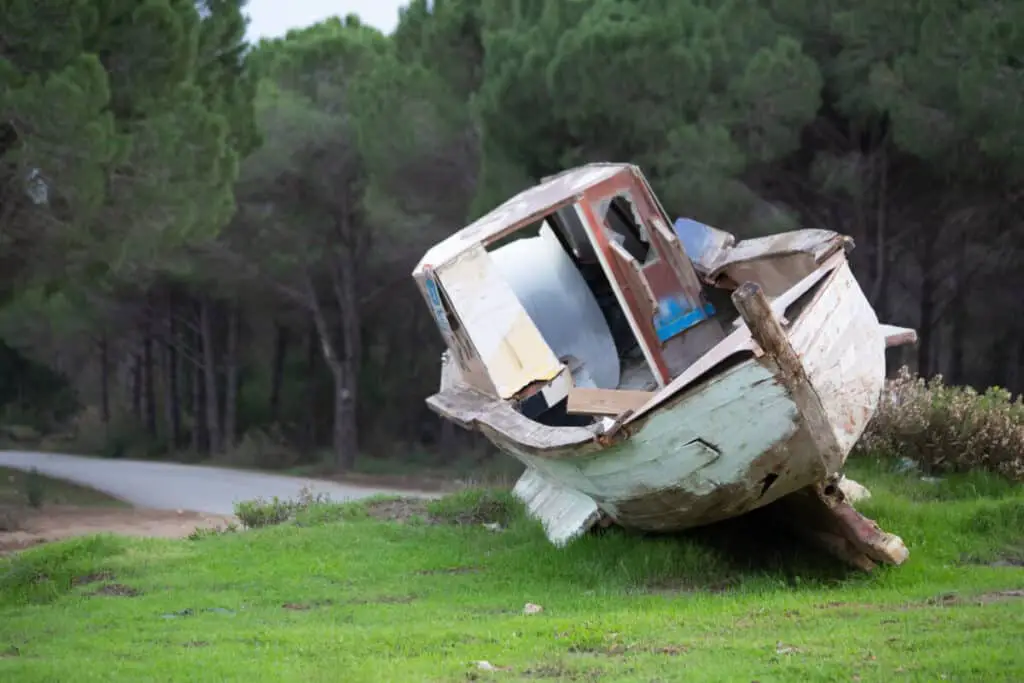
Boats are an excellent way to enjoy the water with family and friends. However, over time boats will deteriorate and need to be replaced. You may have a boat that you need to get rid of and are unsure how to do so.
Boats can be disposed of in a variety of ways including donating them, using them for recycling, or dumping them. While all of these options can work, often the easiest and cheapest way of disposing of a boat is dumping it at a landfill. After paying a fee they will process the boat.
Each of these options provides you a chance to send your boat off in the best way possible. Keep reading to learn more about what each of these options looks like.
How to Dump a Boat
One of the first things that people think of when they have an old boat is that they might have to dump it. Most boats have a lifetime of around 30-40 years before they start to seriously deteriorate. Once this begins the boat can quickly become unusable. On the other hand, you may have a boat that you picked up for cheap as a project.
You always thought that you would have time to work on it, but now you realize that it is just taking up room in your driveway or yard. How do you get rid of it? You can’t exactly cram it into your trash can before the next trash day. This is where a landfill comes in.
Landfills or waste treatment plants are typically the best place to dump your boat. You should never dump or intentionally sink your boat in a river or other body of water. There are often fines for getting rid of your old boat this way and they could also charge you any costs that occur for removing your sunken boat and processing it properly. It is always better to take your boat to someone who can handle it correctly.
In order to get your boat to a landfill, you will probably need a trailer to carry the boat and a vehicle that is able to tow the weight. Trailers are easy to rent or borrow if you don’t have one. Before you make the trip make sure to check if your local landfill or waste treatment accepts old boats. They will often have the information listed on their website or you can call ahead to see what their policies are. There would be nothing worse than going through the work of loading up your boat and driving out only to be turned away at the gate.
There are a couple of things that need to be prepared in general before leaving your boat at a landfill. Most landfills won’t accept the boat if it still has fluids like gas and engine fluids inside. Make sure it is emptied before dropping it off. Remove any batteries, appliances, tanks, and flares.
Specific locations may have other steps for you to prepare your boat, make sure to check with your local location. Many locations will ask that you present the title for the boat or a bill of sale at the landfill. If you don’t have one of these documents check with your state’s motor vehicle office for details on how to obtain them.
Once at the landfill they will ask you to pay a fee to process your boat. The chart below lists some sample prices from four different locations around the United States. Most, if not all, locations will charge you based on the weight of the boat. After weighing your boat they will charge you the applicable amount. The cost of dumping may be different at your location, or they may require an inspection before dumping.
Make sure to check your local place for the most accurate information. Most will require you to dump the boat at a designated area without assistance from staff. You’ll want to ensure you have the tools and manpower necessary to get your boat off the trailer and into the dump.
| Location | Cost |
| Salt Lake City, Utah | $32 a ton |
| Hobart, Wisconsin | $23 a ton up to 880 pounds $52 a ton after |
| San Diego, California | $43 a ton |
| Palm Springs, Florida | $42 a ton |
When can a Boat be Recycled?
Instead of dumping the boat and adding to a mountain of garbage, you may be able to recycle your boat. The most important factor in recyclability is what the boat is made of, specifically the hull. While most aluminum and steel boat hulls are able to be recycled, fiberglass hulls are difficult to impossible to recycle. We have made steps toward being able to recycle more fiberglass boats, but as of now, it is still quite expensive and time-consuming.

Do some research into scrapers and companies that process metal in your area. There is a good chance that they will accept your boat, especially if it’s aluminum, and might even buy it off of you. Once they have the boat they can break it down into smaller pieces and recycle the metal to use in new projects. It might end up as a canoe or even another boat.
If you still would like to recycle your fiberglass boat there may be a scrapper near you that will take it off your hands. Unlike a metal boat, they might not pay you for it and might charge you in order for them to take it. They often strip the boat of all its metal parts like the frame and engine before taking the fiberglass hull to the dump anyway. With a fiberglass boat it might just be simpler to dump it instead.
How to Donate a Boat
If your boat is still in good condition you might want to donate it to a charity. Donating the boat gets it off your lawn and can provide you with a tax break. This is the most complicated of these options for disposing of your boat. First, you will need to find a charity that accepts boat donations like Wheels for Wishes, OOC, or the Sea Scouts.
Once you have charity in mind you need to check if they qualify under the correct type of charity, an IRS-approved 501(c)(3) organization. You’ll need to check if the organization is accepting donations at this time. An accountant might need to help you fill out any forms and make the correct adjustments to your tax forms.
While this is the most complicated way to dispose of an old boat, it is definitely the most satisfying if you can pull it off. If you aren’t able to find an organization you can always put a “for free” sign on your boat and see if one of your neighbors is willing to take it off your hands for you.
Related Topics:
If you like the article above, here are some other similar articles you should check out!
What Should I Do with Old Car Batteries?
